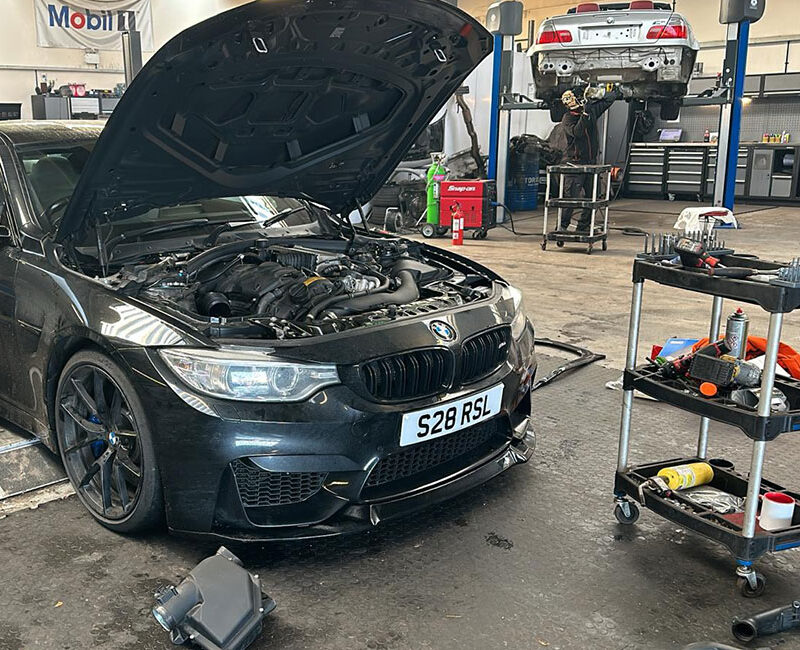Engine Tuning for Track Performance: What You Need to Know
Engine tuning is a crucial aspect of preparing a car for the track. It involves modifying and optimising the engine to enhance its performance, reliability, and suitability for the rigours of track driving. This comprehensive guide covers the essentials of engine tuning for track performance, detailing what you need to know to make informed decisions and achieve the best results.
Understanding the Basics of Engine Tuning
Engine tuning for track performance is not just about increasing power output; it’s about creating a balance between power, reliability, and drivability. It involves various components and systems of the engine, including air intake, fuel delivery, exhaust, ignition, and engine management systems.
Key Areas of Focus for Engine Tuning
- Air Intake System: Improving the engine’s ability to breathe by enhancing the air intake system can significantly increase performance. This might include installing a cold air intake, performance air filters, or larger throttle bodies.
- Fuel Delivery System: Upgrading fuel injectors, fuel pumps, and fuel rails can ensure the engine receives the optimal fuel amount, especially under high-performance conditions.
- Exhaust System: A well-designed performance exhaust system can improve the engine’s efficiency by expediting the expulsion of exhaust gases. Considerations include the diameter of the exhaust pipes and the design of the exhaust manifold or headers.
- ECU Remapping and Tuning: Tweaking the engine control unit (ECU) can unleash extra performance. This process adjusts the software that controls fuel delivery, ignition timing, and in some cases, turbocharger boost pressure.
- Forced Induction Systems: Turbochargers or superchargers can significantly increase power. However, they require careful tuning to maintain engine reliability.
- Internal Engine Modifications: This includes upgrading pistons, rods, camshafts, and valve trains to handle increased power and rev limits.
- Cooling System: Upgraded radiators, oil coolers, and cooling fans ensure the engine maintains optimal operating temperatures, which is critical in track conditions.
Considerations Before Tuning
- Engine’s Health: Ensure the engine is in good condition before tuning. Upgrading a worn-out engine can lead to reliability issues.
- Compatibility: Ensure all modifications work harmoniously. For instance, a large turbocharger might require an upgraded fuel system and strengthened internal components.
- Legal and Insurance Implications: Engine modifications can affect your car’s road legality and insurance. Check these implications if the car will be used on public roads.
- Tuning for Specific Tracks: Consider the nature of the track – some modifications may benefit high-speed tracks, while others might be better suited for technical courses with lots of turns.
DIY vs. Professional Tuning
- DIY Tuning: Suitable for those with mechanical expertise and understanding of engine dynamics. However, it requires caution and thorough knowledge.
- Professional Tuning: Recommended for complex modifications, especially when dealing with ECU tuning and forced induction. Professionals can ensure optimal performance while maintaining engine reliability.
FAQs for Engine Tuning
Q: How much power gain can I expect from engine tuning? A: It varies widely depending on the type of tuning and the base engine. Gains can range from a modest 5-10% for simple tweaks to over 50% for extensive modifications.
Q: Is engine tuning safe for my car? A: If done correctly and responsibly, engine tuning can be safe. However, pushing an engine far beyond its design limits can increase the risk of failure.
Q: Can I tune a high-mileage engine? A: Caution is advised when tuning a high-mileage engine. It’s best to perform a thorough check and possibly rebuild parts of the engine first.
Q: How does engine tuning affect fuel consumption? A: Increased performance often leads to higher fuel consumption, especially under hard driving conditions like track days.
Q: Should I upgrade other car components along with engine tuning? A: Yes, it’s important to upgrade braking, suspension, and cooling systems to handle the increased performance.
In conclusion, engine tuning for track performance is a detailed and complex process that can significantly enhance your track day experience. Whether you choose to undertake some modifications yourself or enlist the help of professionals, a well-tuned engine can bring out the best in your track car, providing increased power, responsiveness, and driving pleasure. Remember, the goal of tuning should always be a well-balanced car that is both fast and reliable.

